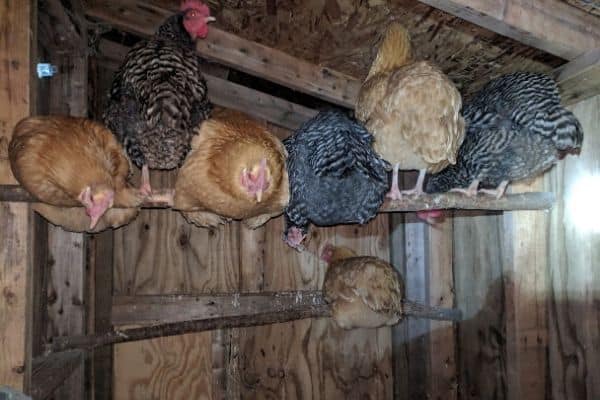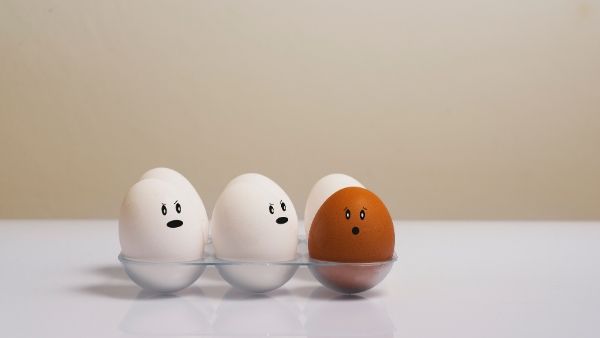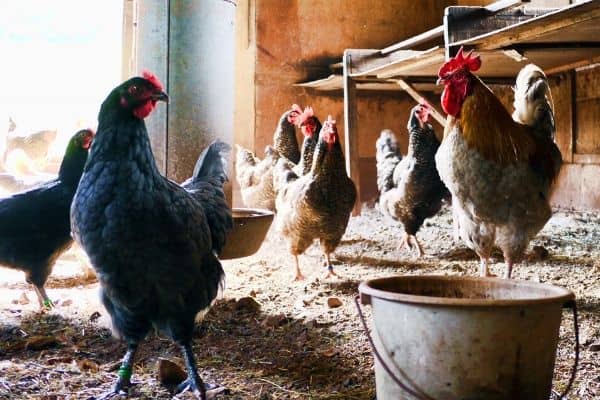One of the most frustrating things about keeping a water trough in a chicken run is that chickens can get into a bad habit of roosting or perching on the edge of the trough, which can lead to them defecating in their own water supply. Not only does this make the chore of providing clean water nastier than it needs to be, it also deters chickens from drinking enough water to lay well or remain healthy.
So how do you keep chickens from pooping in their water? There are many methods to keep chickens from pooping in their water. One way is to set up a hanging waterer with a nipple system or setting up their waterer in such a way that they cannot perch on it. It also helps to provide alternative places to perch so they aren’t tempted to roost near their water.
Chicks and adolescent chickens in particular can get into a bad habit of soiling their water before they’re used to going into the coop at night since they’ll be tempted to roost on the edge of the water trough instead. Keep reading to find out more about why chickens poop in their water and how you can prevent it.
Why Do Chickens Poop in Their Water?
People who aren’t familiar with chickens might be astounded at the fact that chickens would readily poop in their own water to begin with. They aren’t exactly known as being the cleanest animals in the world to begin with, but most kinds of animals will at least take a few efforts to keep their food and water clean.
Why would chickens contaminate their only source of clean water? There’s actually a few different reasons:
- Chickens can’t really control their poop that well. That means that when a chicken’s gotta go, a chicken’s gotta go. Chickens cannot reliably be housebroken and are capable of projecting droppings quite a distance from their rectum in order to prevent their feathers from becoming matted and contaminated. If they’re standing near a waterer when this happens, guess what? It’s getting poop in it.
- Chickens poop a lot. Chickens poop up to fifteen times a day, which is a lot of poop, especially when you have a larger flock of chickens or a bunch of broody hens (who are more inclined to larger, smellier poops than the norm). This means that the chances of some poop ending up in the water supply is high.
- Chickens like to perch on things. If you’ve got a high-sided water trough in your chicken run, chances are your chickens are going to like hanging out on the edge of it because chickens like to perch when they’re not foraging. If they’re perched on it with their rears facing the water, guess what? They’re going to poop right into it.
- Chickens scratch vigorously around while foraging. When they really get going, they can kick materials pretty far too. This means that if you don’t keep the run clean of droppings, chickens will inevitably end up scratching wood shavings, dirt, and poop that is on the ground into their water supply.
Even if your chickens aren’t pooping directly into their water, just the fact that you have so many chickens pooping so much in a confined space means the chance of poop contamination is high if you don’t make efforts to stop them from doing it.
Why It’s Important for Chickens to Have Clean Water
Even though chickens have a bad habit of pooping in their water, it is vital for chickens to have access to fresh, clean, cool water every day. Chickens drink up to a pint of water a day and should never be restricted from having access to it.
While chickens will continue to drink out of a waterer even if it is soiled up to a point, dirty or warm water keeps them from drinking as much as they should to remain healthy and happy. Without access to clean water, laying hens will not lay as well. At a certain point, if the water is dirty enough, the chickens may refuse to drink out of it at all. This can quickly lead to death, especially in warm weather.
Heavily feathered cold weather breeds (such as Orpingtons) can also suffer during periods of intense summer heat and are more inclined to heat exhaustion and other medical problems if they don’t have constant access to cool water.
Chickens do have a certain immunity built-up to environmental bacteria such as coccidiosis and other pathogens that might end up in their water as the result of fecal contamination, but exposure to dirty water over time can lead to gastrointestinal distress and stunted growth. Besides that, every domesticated animal prefers access to cool, clean water over water that is stagnant and dirty. As chicken keepers it is our duty to provide it.
Hacks to Prevent Chickens from Pooping in Water
Chickens have a bad habit of pooping in their water, but luckily there are several ways you can help prevent them from doing it.
Swapping your chickens over to a hanging waterer with a nipple or cup system like this one from Amazon is arguably one of the easiest ways to keep your chicken’s water from getting dirty every day. With a hanging waterer, there is no place on the waterer for chickens to perch, materials from the floor of the chicken run can’t be kicked up into the water, and the water is hung at a level where the chickens can access it.
It is important to remember that if you are swapping your chickens over from a ground-based watering system to a hanging watering system that you do so gradually, leaving their old watering system in place while introducing the new one. If your chickens weren’t raised with a nipple or cup watering system, it may take them a few days or weeks to get the hang of using it.
Be sure to monitor your chickens’ water intake during this period to make sure that they are getting enough to drink, especially if you get to the point that you are trying to remove the water trough entirely and convert the flock over entirely to a hanging waterer. Make sure you observe every chicken drinking from the hanging waterer before removing alternative water sources.
It is also important to ensure that your hanging waterer is installed properly, otherwise the nipples may not dispense water as intended or may leak. If the hanging waterer is the only source of water in the chicken run and it all leaks out, that will leave your chickens high and dry. So proper installation of a hanging waterer is key.
Hack #2: Prevent Chickens from Perching on Waterer
One of the main reasons that chickens end up pooping in their own water is that they try to perch on the edge of the water trough, and like any bird on a perch, they are inclined to eliminate feces in that position. Chickens aren’t as smart as dogs or cats and don’t have any concept of pooping away from their food or water.
In the wild (or free range) this wouldn’t be a problem, as a chicken foraging free would naturally poop away from its source of water in the course of traveling its territory. But in an enclosed space like a coop or run with lots of chickens packed into a small space, it’s almost inevitable that the water becomes contaminated.
If you use a water trough in your chicken run, one way to keep them from perching on it is to cut out a section of stiff plastic garden netting and secure it around the rim of the waterer spiky-side up (make sure to cut it to leave points).
These plastic spikes will poke the chickens’ feet if they jump onto the side of the water trough and prevent them from comfortably perching on the edge but will not prevent the chickens from reaching over it to drink.
Hack #3: Encourage Chickens to Roost in the Coop
One way that chickens can get into a bad habit of pooping in their water is if they learn to roost outside of the coop, especially if they are raised during warm weather where they are just as comfortable sleeping outside as they are sleeping in the coop.
On average it takes several weeks for young chicks to get used to returning to the coop on their own, so if left in the run they will often perch on the nearest available roost. If you have a water trough, this means that many young cockerels and pullets will roost on the side of the trough instead of going into the coop, and this will lead to lots of extra poop in the water.
To prevent this roosting habit from becoming ingrained in your young chickens, it’s a good idea to start encouraging them to go into the coop at night and come out in the morning.
Here are some other ways to encourage your chickens to return to the coop at night:
- Put a light in the coop. Chickens do not like the dark because they are vulnerable to nocturnal predators and don’t see well in darkness, so if you put a small light in the coop at night, this will naturally draw the chickens back in when twilight draws in.
- Put your chickens to bed. Without a mother hen to teach them to go into the coop to roost at night, many young pullets and cockerels will simply sleep on the ground in the run. This means you might end up having to “put your chickens to bed” for several weeks by gathering them and closing them into the coop every evening until they figure it out.
Here’s a video on how I added a small LED solar powered night light to our chicken coop:
As soon as chickens wake up in the morning, chances are they’re gonna poop. So make sure that your chickens are sleeping somewhere other than the edge of your waterer if you don’t want them pooping in their water supply.
Hack #4: Provide Alternative Perches
Another way to prevent chickens from trying to perch on the side of their water trough is to provide plenty of alternative perches for them so they aren’t as tempted to do it. This is a good idea to be used in combination with any of the other hacks on this list, since not only does it help prevent chickens from pooping in their water, it also provides some enrichment activities for them as well.

Adding lots of tree branches and other natural perches throughout the chicken run gives chickens alternative perches that they will usually choose over perching on the edge of the water trough if given a choice between the two. Other good choices of perches are as follows:
- Wooden dowels
- Short ladders
- Chicken swings
- Taut ropes
Set up this chicken swing from Amazon away from water sources to help prevent contamination.
In general giving chickens plenty of things to do in their run and coop such as providing enrichment toys and perches will prevent them from congregating around the water hole quite as much as they would otherwise. In turn, this should help keep down the amount of poop contamination you end up having to deal with.
Hack #5: Move the Water
If your chickens enjoy sleeping in the run in good weather and you want to prevent them from roosting on the water trough when they do, one method to try is to simply move the water trough to a different area of the run then they usually sleep.
Chickens are creatures of habit, so once your pullets have gotten used to piling up in one section of the run, they’re not likely to change from that spot. So if you find your trough is accumulating a lot of poop by being located where the chickens like to sleep or rest outside, moving it to a less prominent area of the run can help discourage them from pooping in it.
Is It Safe to Eat Eggs from Chickens Who Have Been Pooping in Their Water?
The short answer is yes. It’s not going to hurt you to eat clean eggs from hens even if they have been drinking from a dirty water source. But contaminated water can be a problem if the chickens get it on their feet and then go and sit on their eggs.
The part of eggs that prevents them from being penetrated by environmental contaminants (such as poop water) is a membrane called the bloom. When an egg gets wet, either from rain or trough water, this membrane can be washed away. Once that happens, the egg can then be contaminated by all manner of nasty bacteria capable of making people sick.
One of most common ones (and one of the most common source of food poisoning in chicken eggs) is salmonella, which can cause severe gastrointestinal distress. So to prevent a salmonella poisoning from your backyard eggs, make sure to follow these guidelines:
- Only eat eggs that are clean and dry out of a nesting box. Anything that has been lying in the run is suspect, especially if moisture levels are high.
- Keep the chicken run and coop dry. Very few coops are completely waterproof, but it’s best to keep them as dry as you can so that any eggs inside stay nice and dry too. If the chicken run gets mucky as a result of rainy weather, make sure to lay down an extra layer of hay or mulch to take up some of the excess moisture.
- Remove extra droppings from the chicken run on a regular basis. One easy way to keep chicken poop from ending up in your water trough is to regularly clean around roosting bars and pick up any droppings that you see lying around in the run when you go out to feed or check on your chickens. This prevents chickens from accidentally scratching poop into their water source.
Eating clean eggs from chickens drinking out of poop water isn’t necessarily dangerous, but it isn’t especially appetizing, either. Besides that, your chickens deserve better, even if they don’t know better (they’re birdbrains, they can’t help it). As their keeper, it’s your responsibility to make sure your chickens have access to clean, poop-free water at all times.
This won’t just help keep your chickens healthy by preventing their immune systems from having to work so hard, it will also prevent you from having to scrub out and disinfect your water trough every time you fill it up. If you haven’t smelled a trough of water that has had chicken poop marinating in it, spare yourself the experience and prevent it in the first place.
Preventing Chickens from Pooping in Their Water Takes Patience
If your chickens have a bad habit of pooping in their water, it’s not a problem that can usually be solved overnight. It requires a combination of training, sanitation, and environmental modifications in order to make it harder and less tempting for the chickens to do.
Once you put some measures in place to keep chicken butts away from their water, you’ll find that your hens will lay more and look healthier all around than chickens who are forced to drink out of a dirty water source.





